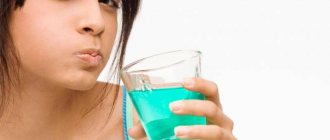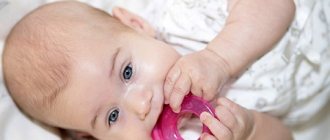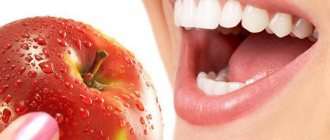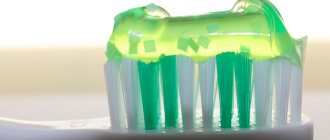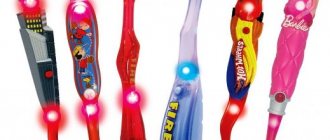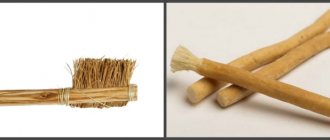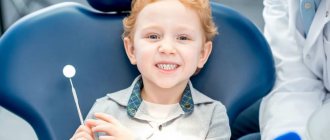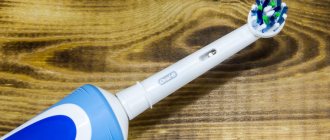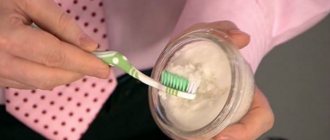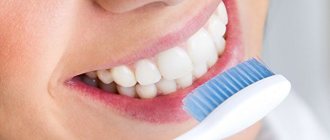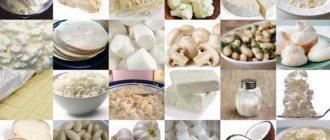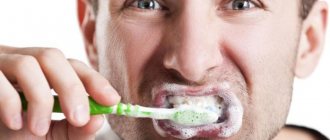Parents should pay due attention to the baby’s personal hygiene, including oral care. That is why the question of at what age children should brush their teeth should arise in moms and dads long before they start teething. And you shouldn’t think that baby teeth don’t need cleaning, because sooner or later they will change anyway. In fact, the health of molars largely depends on how well oral care was organized in early childhood.
When to start brushing your child's teeth
Some parents are of the opinion that brushing baby teeth is not at all necessary. In fact, they need to be cleaned and treated just as thoroughly as permanent ones, since insufficient and untimely care can lead to the formation of caries, and in particularly difficult cases, to pulpitis and periodontitis. Subsequently, all this negatively affects the formation of permanent teeth.
So at what age do children have their teeth brushed? This should begin as early as possible, literally with the eruption of the first incisor. But the timing of the appearance of baby teeth varies from 4 to 10 months. After a year, fangs begin to erupt, and by the age of two, the baby already has a full set of teeth - as many as 20 pieces.
Does my child need to brush his teeth?
There is an opinion in parent circles that there is no need to care for baby teeth.
By basing their opinion on the phrase “they will fall out anyway,” adults are mistaken. The oral cavity is an ideal place for bacteria to live and multiply. Failure to maintain hygiene leads to diseases of the gums and oral mucosa. With saliva, some microorganisms enter the stomach, sometimes causing inflammation and diseases of internal organs.
Leftover food is a breeding ground for microorganisms, which, in the process of life, form plaque. Acids are released from it. Exposure to acids released by plaque destroys thin enamel.
This leads to the formation of caries. A carious tooth is a source of bacteria and infections that can lead to stomatitis, pulpitis, and cause pain or discomfort in a child.
Teeth affected by caries are not only unsightly. They can lead to infection of the molars, which are located in the gums. And the early loss of baby teeth sometimes leads to improper eruption of permanent teeth, curvature and asymmetry of the bite.
Basic hygiene, or oral care before teething
Many dentists recommend starting to care for your child’s oral cavity even before his or her first baby teeth begin to emerge. This is a good prevention of candidiasis, or thrush, and will also minimize the inflammatory process when teeth begin to erupt. So at what age do children have their teeth brushed?
Children begin to brush not their teeth, but their gums at about three months, that is, a couple of months before they begin to erupt. To do this, use a gauze swab. To clean the oral cavity, it is moistened in boiled water and immediately after eating, wipe the inner surface of the cheeks, gums and tongue. And about once a week, to prevent candidiasis and dental diseases, it is recommended to moisten a gauze swab in a weak soda solution.
How to teach a child to brush their teeth
Healthy teeth are the key to a child’s future health, so you need to teach your child to care for them from early childhood. In order for the process of brushing teeth to bring pleasure to the baby, parents need to:
- Lead by example. (Take your child to the bathroom with you in the morning and evening so that the child can understand that brushing teeth is a necessary hygienic procedure.)
- Come up with an interesting game for your child, during which you show and explain how to brush your teeth correctly.
- Tell your little one a fairy tale about how nice it is for the teeth that their owner takes care of them every day.
- Buy a special children's brush for your baby that might interest him (a brush in the shape of his favorite cartoon character, a brush that changes color or makes sounds).
- Allow your child to choose a brush, toothpaste and cup in the store. This will strengthen his desire to brush his teeth.
- Entertain the baby during the procedure. Accompany teeth brushing with funny nursery rhymes and songs.
- Invite your child to brush the teeth of his favorite bunny or bear.
- Show educational cartoons about the benefits of daily brushing your teeth.
- Be sure to praise the child when he completes the procedure.
It is important for parents to remember that children's teeth need to be brushed twice a day for 3 minutes every day. This is the prevention of caries and other dental diseases. The main thing is to be patient and teach the child to perform this procedure correctly and joyfully. Then the baby will always have healthy teeth and a snow-white smile.
Video: how to teach children to brush their teeth.
By
Brushing your first teeth
The very first devices that parents use to clean newly erupted teeth are silicone finger pads. They are intended for massaging the gums during teething and for cleaning teeth before the introduction of the first complementary foods. Then another question arises: at what age can a child brush his teeth with a toothbrush?
As soon as the baby begins to get acquainted with adult food, the first plaque forms on the enamel, which is food for caries and, accordingly, needs to be cleaned. Then you can buy your baby a brush. However, the brush can have silicone bristles and can also be worn on your finger. But using the paste is still categorically not recommended. For a one-year-old baby, it is enough to moisten the brush in boiled water and walk it over the surface of the teeth.
Rules of care
6-8 months is the approximate time interval at which time you should start brushing the teeth of a child whose baby incisor has just emerged. However, you should take care of your mucous membranes, tongue and gums almost from birth.
There are many modern accessories for painless and safe procedures, suitable for different age categories. Before buying such a product, it is useful to read the labeling on the packaging and make sure that it is exactly intended for the baby.
First teeth
Oral care should be carried out immediately after discharge from the maternity hospital. Parents should wipe soft tissues with a napkin soaked in water, herbal decoction or bactericidal alcohol-free infusion.
When baby incisors appear on the surface, you need to purchase a silicone brush tip. With its help, plaque is removed and painful mucous membranes, inflamed and swollen due to teething, are massaged.
Useful tips:
- movements – “sweeping”;
- the nozzle should be placed in the child’s mouth at an angle of 45 degrees to the gums;
- the inner dental part is cleaned with short strokes;
- Each unit is given up to 15 seconds.
Child under 1 year old
Children at 8-10 months still have too few teeth, so you don’t need to use either a brush or toothpaste. It is enough to take a piece of gauze, moisten it in warm boiled water and wipe the oral cavity.
During teething or gum inflammation, it is recommended to regularly use herbal infusions. When there are no dental diseases, you can resort to cleaning with herbs once a week for preventive purposes.
A soft silicone brush that fits on your finger will also work. It is necessary to clean not only the internal and external surfaces of the teeth, but also the tongue, gums, and the space behind the cheeks. You can brush your one-year-old child’s first teeth with either damp gauze or special dental wipes for the little ones, sold in pharmacy chains.
All manipulations should be carried out extremely carefully. Teething causes severe discomfort, and the baby will not like it if parents increase the unpleasant symptoms while performing hygiene procedures.
Children over one year old
You can purchase a special brush with silicone bristles. It is soft and does not damage mucous membranes. For such an accessory, relatives will have to pay a little more than for a regular one, but all expenses will be justified.
With this product, food debris and bacteria are removed, while the enamel remains intact, and there is no damage to the inside of the cheeks, gums and crowns. Cleaning will not cause any discomfort.
The only drawback of silicone brushes is their short service life. They should be periodically replaced with new ones.
How to brush your teeth at 2 years old
When the child is fully introduced to complementary foods and begins to gradually move to the main table, the boiled water with which parents moisten the toothbrush will no longer cope with so much plaque and food debris. Here, the question of at what age to start brushing a child’s teeth should no longer be a question for parents. Two years is the deadline. And urgently and immediately. Otherwise, food debris that gets stuck between teeth that are tightly aligned in a row (and by this age there will already be 20 of them in the dentition) will become food for caries.
That is why, at 2 years old, teeth need to be brushed with a special brush and toothpaste. Moreover, if a child has been accustomed since childhood to brush his gums, and then his teeth, twice a day, then for him the new duty will not become a big problem and he will only do it with pleasure.
At what age should a child brush his teeth with toothpaste?
So, the child is 2 years old, and the parents’ task at this moment is to introduce him to toothpaste and teach him how to use a brush correctly. But if the answer to the question at what age children brush their teeth no longer arises, then another controversial point follows. Which toothpaste should I buy for my child—with or without fluoride? Can the paste be used for adults?
A two-year-old child is only allowed to brush his teeth with a specialized children's toothpaste. Compared to adults, it contains fewer abrasive substances and has flavoring and aromatic additives. In addition, enzymes, casein, xylitol and calcium are added to children's toothpastes, which improve tooth structure and have a bactericidal effect. For children under 3 years of age, toothpastes that do not contain fluoride are produced. A child can even swallow them without harm to his health.
Technique
The technique for proper brushing of teeth in children is as follows:
- The procedure for brushing teeth in children is similar to that of adults. The brush is applied to the base of the teeth and is directed upward with sweeping movements. That is, cleaning occurs from the gums to the edges.
- Similar actions are repeated from the inside and outside, right and left. This method of “sweeping” is necessary to clean all the teeth. In this case, the pressure on the enamel should be minimal. It is important not to damage your teeth or gums when brushing.
- Chewing teeth should be brushed in a circular motion from above.
- During the cleaning process, do not forget about the tongue. It is cleaned with the back of a toothbrush, which is exactly what it is designed for.
- To speed up the process, you can use electric brushes. At what age should a child’s teeth be brushed with this device? From about three years old, before this age you shouldn’t even try.
When brushing your teeth, it is recommended to use game elements, such as an hourglass. The child should know that as soon as the sand is poured, the cleaning will end.
Dr. Komarovsky told us when and how to brush a child’s teeth: important tips
Doctor Evgeniy Komarovsky answered the question of when to brush a child’s teeth
According to the doctor, as soon as the child’s first tooth erupts, it’s time to brush it, writes Рoliteka.net. To do this, parents must have the correct dental abrasive. (Scroll to the bottom of the page to watch the video)
These brushes are designed for different finger thicknesses. This is usually a game. You can brush your baby's teeth while bathing or when mom brushes her own teeth.
And when the baby has learned to hold a fork and spoon, and strives to take his mother’s brush, the time has come for a personal brush for the child and it should be special. The tool should have a restrictive ring that will prevent the child from inserting the brush too deeply.
Popular articles now
New money will appear in Ukraine from November 2: the NBU clarified important nuances
Boycott "Kvartal 95" under the leadership of Koshevoy, people are ready to take extreme measures: "Zhenya, soon the pack will crack"
The real appearance of Ivleeva from “Heads and Tails” caused shock, the deception was revealed: “A brunette with big eyes”
“Cleopatra or Polyakova”: crazy Nikityuk showed off the elasticity in her daring neckline without a drop of shame
show more
Let us remind you that Komarovsky published a new post on social networks about maternal fears.
He told a story about a baby whose father complained about his wife.
“Doctor, she’s yelling at me that I’m walking around the room too fast and because of this the child is affected by a draft,” Komarovsky wrote the father’s complaint.
Komarovsky replied that logical arguments do not work in such situations. Therefore, the pediatrician is now thinking about a big lecture about maternal fears.
We wrote earlier that the vast majority of advertised cough medicines are expectorants and/or mucolytics: drugs that increase the volume of sputum and make it more liquid and fluid.
According to the doctor, expectorants are only sometimes needed for some diseases of the lower respiratory tract. Such drugs do not reduce, but only intensify the cough, activating the discharge of sputum.
Let us also recall that Yevgeny Komarovsky told Ukrainians when it is advisable to self-medicate at home.
Now the main task of doctors is to teach people what opportunities they have to make their own diagnoses and help each other.
“You have the opportunity to self-medicate only when you have personal experience of this situation,” the doctor said.
Let us remind you that Komarovsky revealed the secret of how to protect a child in the first years of life
Politeka also wrote that Komarovsky told what is dangerous to do when you cough
Politeka also wrote that Komarovsky told the truth about chocolate
Choosing a toothbrush
Another important point concerns the choice of toothbrush. The fact is that the brushes that adults use to brush their teeth are not suitable for children. There are special requirements for choosing this product for children:
- You should not buy brushes with natural bristles for your child. The fact is that dangerous microorganisms and bacteria accumulate in it, which simply cannot be removed with a stream of water. In addition, natural bristles are hard and can damage the baby’s delicate gums.
- A toothbrush should be selected according to the age of the baby. If he is not yet two years old, you can use finger pads to care for the enamel and tongue, which also do an excellent job of removing plaque.
- The size of the toothbrush head should be round and small in size. This will reduce the level of injury during enamel cleaning.
Many dentists recommend buying electric brushes that run on batteries to clean your teeth. Their advantage is that plaque from the enamel and tongue is removed efficiently and quickly. The only drawback is that not all children perceive such brushes adequately. For some, vibration causes fear, and they categorically refuse cleaning.
At what age should a child brush his teeth: E. O. Komarovsky and his recommendations
The famous pediatrician Dr. Komarovsky gives his recommendations for brushing your teeth. He advises starting this process as early as possible, starting with the first tooth, and recommends using silicone onlays for this. But parents should not forget that all this should happen in the form of a game, that is, the child should like the process itself. This will allow you to develop a positive reaction to the duty of brushing your teeth in the future.
Also, parents should not forget at what age a child should brush his teeth. At a maximum of 2 years old, they should introduce him to brush and toothpaste. Moreover, if a child categorically refuses to fulfill such a duty, he should not be forced. If necessary, you can wait up to three years. The main thing is not to force anyone to brush their teeth. It would be better to use methods in education in which the child will have a desire to brush his teeth on his own, without pressure from his parents.
My baby refuses to brush his teeth, what should I do?
It's rare to find a child who enjoys brushing their teeth. What to do if the baby does not allow the procedure to be carried out and begins to be capricious? I offer you a number of tips to help make this process easier:
- The procedure of brushing your teeth can be turned into a game. Let someone distract the child and concentrate his attention on himself. If necessary, sing songs and recite rhymes. For example, I told the kid a fairy tale about a small brush that my son needed to clean his teeth with and that he would send to other children to do the same.
- When cleaning your mouth, try using different products. Perhaps the baby doesn’t like the fingertip or the brush is not soft enough, or the toothpaste has a nasty taste. Experiment. My little one liked the strawberry flavored pasta the most.
- And most importantly, do not force your baby to brush his teeth by force or threats. It will only ruin everything. Set someone as an example and encourage them to try brushing their teeth every day.
Proper oral care means healthy teeth and a beautiful smile. Dental care promotes the formation of a correct bite, the normal development of permanent teeth, and protects against caries and bacterial growth. Teach your child to take care of his teeth from childhood. This will be the key to his accuracy and good health.
Important tips for brushing your teeth
The key to a beautiful smile for an adult largely depends on how well oral care was organized at an early age. The following recommendations will help many parents avoid mistakes in the future:
- You should start teaching your child how to take care of the oral cavity as early as possible, namely at three months of age. Then there will be no unnecessary questions regarding the age at which a child should be taught to brush their teeth. Everything will happen gradually, just first the role of a brush will be played by a gauze swab and a silicone pad on the finger, and then by a toothbrush with paste.
- You should choose a high-quality paste, with a short shelf life and without fluorine in the composition.
- Preventative dental examinations should be performed twice a year. This will allow for timely detection of diseases and timely treatment of teeth, which will subsequently have a positive effect on the health of the entire oral cavity.
First brush
You can truly brush your teeth from the moment your first incisors erupt. For this purpose, special toothbrushes with one or two rows of silicone bristles are sold. Their heads are very small to match the size of the mouth during the first years of life. Usually the head does not exceed 1-1.5 cm.
All corners of the brush are rounded, the handle is thin so that the child can hold it comfortably. It is recommended to use this device for up to three years. At this time, there is no talk of independent high-quality cleaning, but the first dental hygiene skills are instilled, which will serve as the basis for dental care for life.
As soon as the baby learns to spit out the contents of his mouth when necessary and at the request of his parents, children's toothpaste can be used. Put a minimal amount of it. In order to remove plaque efficiently, parents must carry out additional cleaning with their own hands after cleaning themselves.
From the very beginning, elders should instill in the baby that such care is required twice a day: morning and evening. This period is also considered ideal to begin cleaning the surface of the tongue and cheeks, where many bacteria accumulate. If the habit of such meticulous hygiene is developed at an early age, it will become a lifelong skill that will improve a person's dental health.
